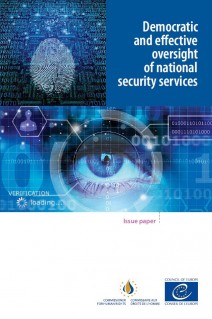



Disclosures by US intelligence contractor Edward Snowden about bulk surveillance of electronic communications have given rise to serious concerns about violations of the right to privacy and family life, freedom of expression and freedom of association. These ongoing revelations follow a decade of others on the involvement of some security services in serious human rights violations. All of this brings into question the adequacy of the legal regulation and oversight of security service activity in the Council of Europe area.
This issue paper focuses on the role of national institutions responsible for authorising, monitoring, scrutinising and reviewing security service activity and, to a lesser extent, executive bodies responsible for security services. The following types of oversight institution are considered through examples from various European states: parliamentary committees, judicial and quasi-judicial bodies, expert security and intelligence oversight bodies, data and information commissioners, ombudsman institutions and the executive and internal control mechanisms within security services.
Alongside analysis of national oversight practices, this issue paper also takes stock of the growing body of international hard and soft law principles relevant to the supervision of security services. Particular attention is paid to the relevance of the European Convention on Human Rights and its case law in this area. The publication gives special emphasis to the oversight of activities that generate ongoing human rights concerns, including co-operation with security and intelligence services of other states, untargeted, bulk surveillance of electronic communications and computer network exploitation (hacking).
The issue paper sets out a series of recommendations on how the supervision of security services can be enhanced to promote better protection of human rights in this area of state activity. Recognising that there is no single “best” model or system of oversight, the recommendations put forward principles that can be implemented in any political or constitutional set-up.
Contents
EXECUTIVE SUMMARY
1. Overview of the impact of national security services’ activities on human rights protection in Europe
2. Overview of international and European standards concerning democratic oversight over national security services
3. National practices in Council of Europe member states
4. Towards a democratic and effective oversight of national security services
COMMISSIONER’S RECOMMENDATIONS
On general parameters for a system of oversight
On the scope of oversight of security services
On the independence and democratic legitimacy of oversight bodies
On the effectiveness of oversight bodies
On transparency and engagement with the public
On reviewing oversight bodies and systems
CHAPTER 1. INTRODUCTION
CHAPTER 2. OVERVIEW OF THE IMPACT OF NATIONAL SECURITY SERVICES’ ACTIVITIES ON HUMAN RIGHTS PROTECTION IN EUROPE
2.1. Personal integrity and liberty
2.2. Right to privacy and family life
2.3. Rights to freedom of expression, assembly and association
2.4. Right to a fair trial and the right to an efective remedy
CHAPTER 3. OVERVIEW OF INTERNATIONAL AND EUROPEAN STANDARDS CONCERNING DEMOCRATIC OVERSIGHT OF NATIONAL SECURITY SERVICES
3.1. International and regional legal instruments
3.2. Non-binding recommendations and principles
CHAPTER 4. NATIONAL PRACTICES IN COUNCIL OF EUROPE MEMBER STATES
4.1 Parliamentary committees
4.2 Independent oversight institutions
4.3 Judicial bodies
4.4. Quasi-judicial authorisation bodies
4.5. Executive
4.6. Internal controls
4.7. Media and civil society
CHAPTER 5. TOWARDS DEMOCRATIC AND EFFECTIVE OVERSIGHT OF NATIONAL SECURITY SERVICES
5.1. Ex ante authorisation of intrusive measures
5.2. Complaints handling
5.3. Access to information by overseers
5.4. Transparency of oversight bodies
5.5. Evaluation of oversight systems
REFERENCES
COURT CASES
European Court of Human Rights
National courts
Télécharger un extrait (1000)



Disclosures by US intelligence contractor Edward Snowden about bulk surveillance of electronic communications have given rise to serious concerns about violations of the right to privacy and family life, freedom of expression and freedom of association. These ongoing revelations follow a decade of others on the involvement of some security services in serious human rights violations. All of this brings into question the adequacy of the legal regulation and oversight of security service activity in the Council of Europe area.
This issue paper focuses on the role of national institutions responsible for authorising, monitoring, scrutinising and reviewing security service activity and, to a lesser extent, executive bodies responsible for security services. The following types of oversight institution are considered through examples from various European states: parliamentary committees, judicial and quasi-judicial bodies, expert security and intelligence oversight bodies, data and information commissioners, ombudsman institutions and the executive and internal control mechanisms within security services.
Alongside analysis of national oversight practices, this issue paper also takes stock of the growing body of international hard and soft law principles relevant to the supervision of security services. Particular attention is paid to the relevance of the European Convention on Human Rights and its case law in this area. The publication gives special emphasis to the oversight of activities that generate ongoing human rights concerns, including co-operation with security and intelligence services of other states, untargeted, bulk surveillance of electronic communications and computer network exploitation (hacking).
The issue paper sets out a series of recommendations on how the supervision of security services can be enhanced to promote better protection of human rights in this area of state activity. Recognising that there is no single “best” model or system of oversight, the recommendations put forward principles that can be implemented in any political or constitutional set-up.
Attention, en vertu de nos conditions générales de vente, l'achat des PDF/epub est réservé aux particuliers.
